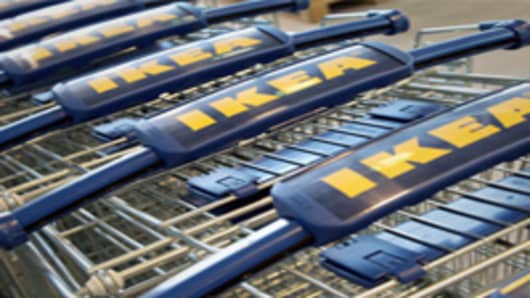Can a retail store be too popular? For IKEA in China, the answer is yes as too many customers and crowded aisles are hurting sales. Why? Over its decade there, IKEA has become an entertainment destination more than a serious furniture-shopping place.
Consumers check out displays to get ideas on how to decorate homes. Some even nap on beds. Families buy 25-cent hot dogs while kids play in the clean and air-conditioned environment. IKEA has become a mini Disneyland for cash-starved Chinese.
At first glance, packed stores would seem to translate into big growth for IKEA. Their revenue there is growing 20 percent a year and they plan to double their stores to 16 by 2015. Unfortunately, much of the growth is due to discounting and the selling of low margin products as I told CNBC anchor Oriel Morrison on a recent Cash Flowappearance.
Many consumers flocking their aisles cannot afford fat margin furniture items. Instead they take photos, or even grab IKEA catalogs, and copy products at cheap custom furniture stores. If they do spend, they buy dollar bathmats and drinking glasses. IKEA now sells coffee tables that cost less than a Starbucks latte.
Basing a sales growth model on discounting and cheap products is not a viable long-term strategy. Several hundred upper middle class consumers told my firm in interviews they are put off by IKEA’s large crowds and cheap prices. In other words, IKEA is too expensive for the majority of consumers, but too cheap for real spenders.
However, unlike Best Buy and Home Depot that failed in China because they did not adjust to consumer preferences and domestic competition, IKEA management is innovating new business models by going into real estate development to fill two weak areas in the marketplace.
First, unlike IKEA, many brands have problems attracting shoppers. IKEA is leveraging its ability to draw consumers to create retail project developments with its stores as anchor tenants. It will rent out space to brands that want to be near crowds. With retail sales growing 16-18 percent there, brands from Gap to Ralph Lauren to Sephora are planning large expansions.
They naturally gravitate to areas with the best foot traffic and will pay plum rents. In other words, IKEA will generate money not from its core expertise of furniture but from rent, much as Google generates money from advertising rather than charging for its search and email services.
IKEA will also bring its strong branding and design layouts to its real estate ventures – skills, which are sorely lacking in the market. Although the odds of a dangerous real estate bubble on the residential side emerging is low because there is little leverage in the market; many commercial mall developments are ill conceived and will fail.
Real estate developers often have connections to get prime locations or bank loans but don’t develop well-designed and branded shopping areas. They don’t maximize space or create a good eco-system of stores. The result is giant shopping complexes devoid of consumers.
Take Super Brand Mall in Shanghai as an example. Until several years ago it had vendors selling pirated items on the 4th floor while legitimate versions were sold on the first. A big complaint of brands, which they have spoken of to my firm, is that they cannot find good retail space with professional management teams and cohesive target markets.
In IKEA’s case, it is teaming up with French supermarket chain Auchan and consumer electronics chain Suning to develop centers with the right mix of brands that middle class Chinese consumers like.
Retail is in its infant stage in China. Unlike in America where many electronics stores make as much if not more money selling warranties than actual products as an example, in China electronics retailers like GOME have double-digit margins. As real estate and labor costs soar and as e-commerce sites grow, retailers will have to develop new business models out of their core expertise areas as IKEA has done.
Brands should learn that if you don’t adapt like IKEA to local conditions, you will fail as Best Buy and Home Depot did.
Shaun Rein is the founder and managing director of the China Market Research Group (www.cmrconsulting.com.cn) a strategic market intelligence firm, and is based in Shanghai. Follow him on Twitter at @shaunrein.


